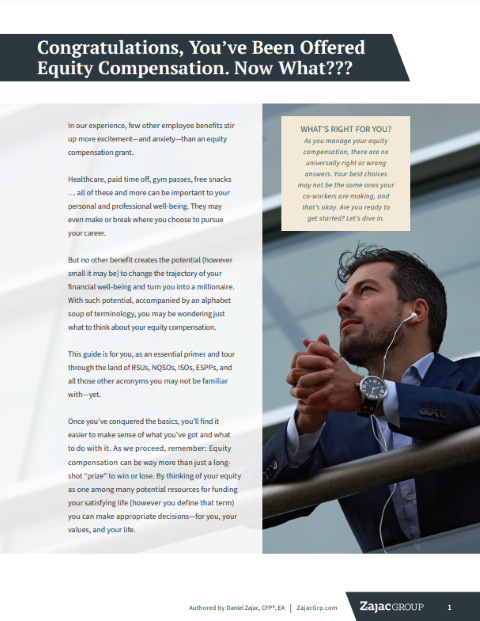Most stock options have a finite lifespan, after which you lose the right to exercise them. Typically, the expiration date is a set number of years after the grant date—often 10 years—but it can be shorter. The document describing your equity compensation package should provide the specific terms for your company’s program.
Category: E
Exercise price/strike price
This is the per-share price you’ll pay if you decide to exercise your stock options. Your exercise price is usually set as the fair market value of the stock on your grant date. This means, as long as the stock increases in value, you get to purchase it at a discount when you exercise your options.
Exercise (and hold or sell)
Once your stock options vest, you have the right, but not the obligation to exercise them. To exercise your options, you purchase stock shares at their exercise price, rather than their fair market value on that day. The lower your exercise price is compared to the stock’s fair market value at exercise, the better “discount” you’ll receive on your exercised shares. For example, say your exercise price is $1/share for 1,000 shares of company stock, which is currently trading at $5/share. You can purchase those shares for $1,000, even though they’ll be immediately worth $5,000. You can then continue to hold those shares, and hope the price continues to rise. Or, you could sell them, and pocket the after-tax difference.
Exercise date
The date on which you choose to exercise your stock options.
Equity compensation
A broad term referring to all forms of stock options your employer may offer you as an employee benefit. For example, equity compensation can be offered in the form of incentive stock options, non-qualified stock options, restricted stock units, restricted stocks, etc. Each type of equity compensation may differ in its tax treatment, as well as how and when vesting and exercise opportunities occur. The common goal is to reward you for a job well done and/or encourage you to remain an employee moving forward, while offering you a potential windfall stake if your company succeeds and its stock rises.
Equity/stock
If you exercise your stock options, you will receive purchase shares of company stock, or equity, which represent an ownership stake in your company. Once you’ve acquired stock, you own it permanently, whether or not you work at the company. As long as your company is publicly traded, you can sell your stock whenever you choose (subject to restrictions such as a blackout period or lock-up period) —again, whether or not you still work there.
Employee Stock Purchase Plan (Qualified)
A qualified employee stock purchase plan allows employees to purchase shares of stock through convenient payroll deductions, often at a discount to the fair market value. Some ESPPs include a lookback provision, making a good ESPP potentially more attractive.
Early Exercise
A provision in an employee stock option agreement that allows you to exercise an employee stock option prior to the option vesting. An early exercise is often combined with an 83(b) election in an attempt to mitigate tax.
Dive Deeper
Whether you’re just getting started or expanding your knowledge, here are some resources to get you started.
NEW! The Ultimate Guide to Equity Compensation

Understand what you have, what you should consider, and what ultimately matters to you.
Hi, I'm Daniel Zajac, CFP®, EA

I write about equity compensation and employee stock options in a way that is easy to understand.
NEW! The Ultimate Guide to Equity Compensation
Understand what you have, what you should consider, and what ultimately matters to you.
FREE DOWNLOAD
Get the Ultimate Guide to Incentive Stock Options to better understand your equity compensation.


